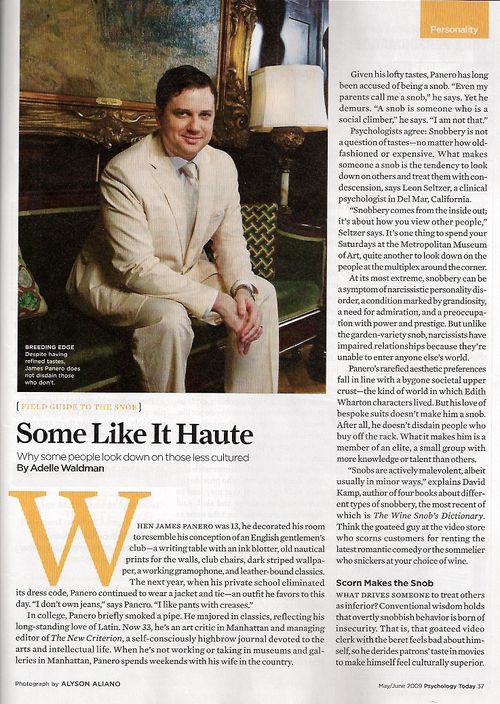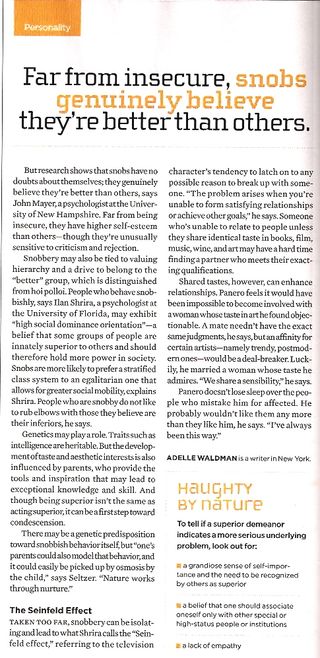PSYCOLOGY TODAY
May-June 2009
'Some Like it Haute'
by Adelle Waldman
Field Guide to the Snob: Some Like It Haute
When James Panero was 13, he decorated his room to resemble his conception of an English gentlemen's club—a writing table with an ink blotter, old nautical prints for the walls, club chairs, dark striped wallpaper, a working gramophone, and leather-bound classics.
The next year, when his private school eliminated its dress code, Panero continued to wear a jacket and tie—an outfit he favors to this day. "I don't own jeans," says Panero. "I like pants with creases."
In college, Panero briefly smoked a pipe. He majored in classics, reflecting his long-standing love of Latin. Now 33, he's an art critic in Manhattan and managing editor of The New Criterion, a self-consciously highbrow journal devoted to the arts and intellectual life. When he's not working or taking in museums and galleries in Manhattan, Panero spends weekends with his wife in the country.
Given his lofty tastes, Panero has long been accused of being a snob. "Even my parents call me a snob," he says. Yet he demurs. "A snob is someone who is a social climber," he says. "I am not that."
Psychologists agree: Snobbery is not a question of tastes—no matter how old-fashioned or expensive. What makes someone a snob is the tendency to look down on others and treat them with condescension, says Leon Seltzer, a clinical psychologist in Del Mar, California.
"Snobbery comes from the inside out; it's about how you view other people," Seltzer says. It's one thing to spend your Saturdays at the Metropolitan Museum of Art, quite another to look down on the people at the multiplex around the corner.
At its most extreme, snobbery can be a symptom of narcissistic personality disorder, a condition marked by grandiosity, a need for admiration, and a preoccupation with power and prestige. But unlike the garden-variety snob, narcissists have impaired relationships because they're unable to enter anyone else's world.
Panero's rarefied aesthetic preferences fall in line with a bygone societal upper crust—the kind of world in which Edith Wharton characters lived. But his love of bespoke suits doesn't make him a snob. After all, he doesn't disdain people who buy off the rack. What it makes him is a member of an elite, a small group with more knowledge or talent than others.
"Snobs are actively malevolent, albeit usually in minor ways," explains David Kamp, author of four books about different types of snobbery, the most recent of which is The Wine Snob's Dictionary. Think the goateed guy at the video store who scorns customers for renting the latest romantic comedy or the sommelier who snickers at your choice of wine.
Scorn Makes the Snob
What drives someone to treat others as inferior? Conventional wisdom holds that overtly snobbish behavior is born of insecurity. That is, that goateed video clerk with the beret feels bad about himself, so he derides patrons' taste in movies to make himself feel culturally superior.
But research shows that snobs have no doubts about themselves; they genuinely believe they're better than others, says John Mayer, a psychologist at the University of New Hampshire. Far from being insecure, they have higher self-esteem than others—though they're unusually sensitive to criticism and rejection.
Snobbery may also be tied to valuing hierarchy and a drive to belong to the "better" group, which is distinguished from hoi polloi. People who behave snobbishly, says Ilan Shrira, a psychologist at the University of Florida, may exhibit "high social dominance orientation"—a belief that some groups of people are innately superior to others and should therefore hold more power in society. Snobs are more likely to prefer a stratified class system to an egalitarian one that allows for greater social mobility, explains Shrira. People who are snobby do not like to rub elbows with those they believe are their inferiors, he says.
Genetics may play a role. Traits such as intelligence are heritable. But the development of taste and aesthetic interests is also influenced by parents, who provide the tools and inspiration that may lead to exceptional knowledge and skill. And though being superior isn't the same as acting superior, it can be a first step toward condescension.
There may be a genetic predisposition toward snobbish behavior itself, but "one's parents could also model that behavior, and it could easily be picked up by osmosis by the child," says Seltzer. "Nature works through nurture."
The Seinfeld Effect
Taken too far, snobbery can be isolating and lead to what Shrira calls the "Seinfeld effect," referring to the television character's tendency to latch on to any possible reason to break up with someone. "The problem arises when you're unable to form satisfying relationships or achieve other goals," he says. Someone who's unable to relate to people unless they share identical taste in books, film, music, wine, and art may have a hard time finding a partner who meets their exacting qualifications.
Shared tastes, however, can enhance relationships. Panero feels it would have been impossible to become involved with a woman whose taste in art he found objectionable. A mate needn't have the exact same judgments, he says, but an affinity for certain artists—namely trendy, postmodern ones—would be a deal-breaker. Luckily, he married a woman whose taste he admires. "We share a sensibility," he says.
Panero doesn't lose sleep over the people who mistake him for affected. He probably wouldn't like them any more than they like him, he says. "I've always been this way."—Adelle Waldman

